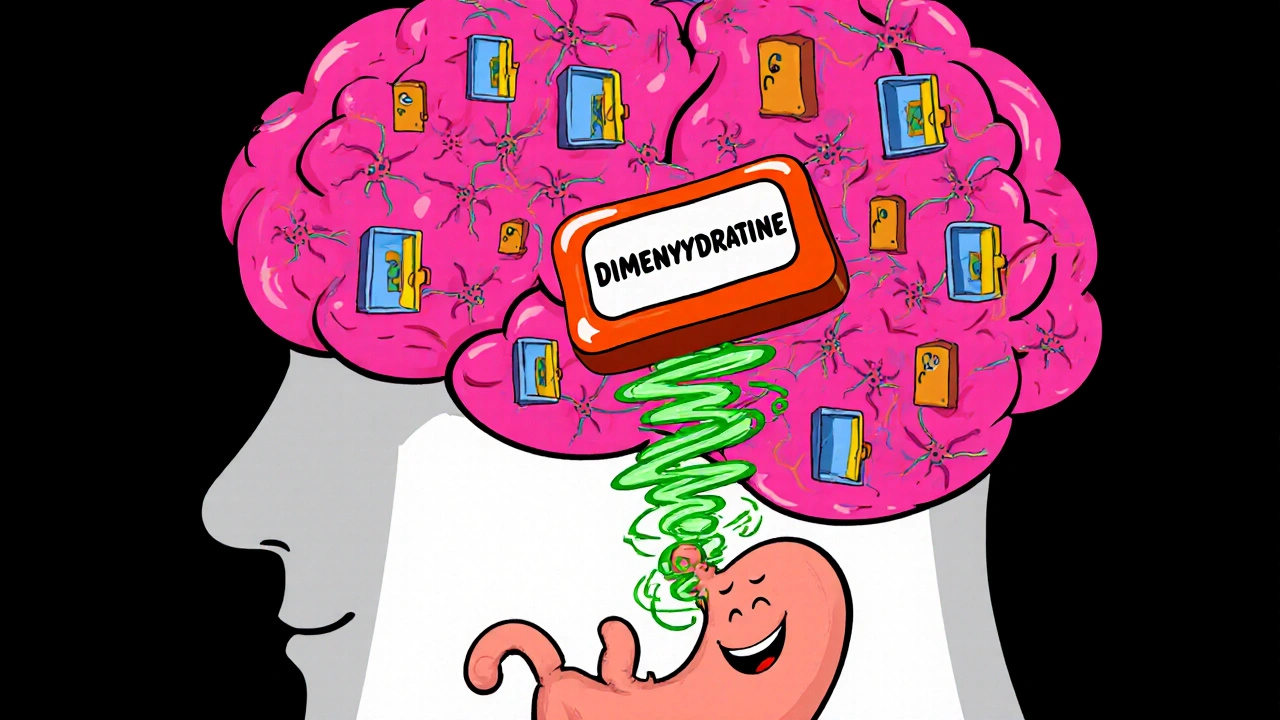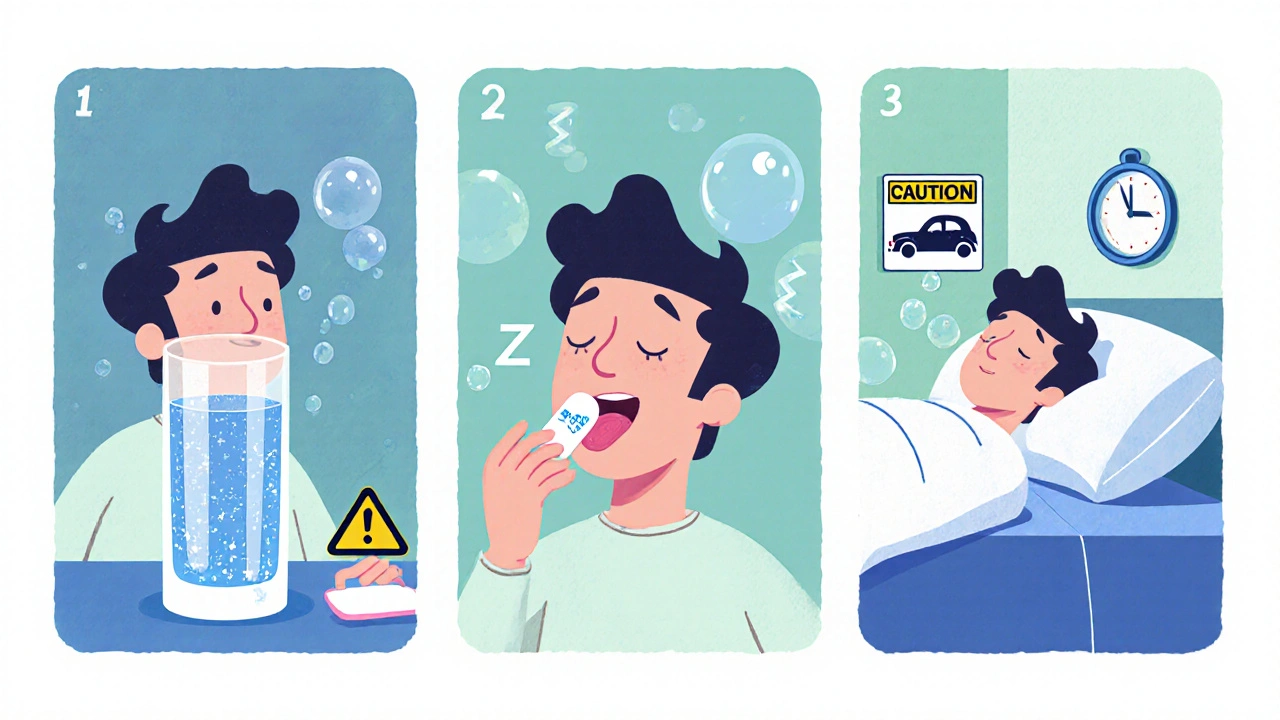After a night of heavy drinking, the morning after can feel like a battle with nausea, headache and a general sense of wobbliness. People often reach for coffee, greasy food or over‑the‑counter pain relievers, but a surprising option that shows up in forums is dim enhydrinate. This article breaks down what dimenhydrinate actually is, how it might touch hangover symptoms, and whether it’s a safe bet for your post‑party recovery.
What is Dimenhydrinate?
Dimenhydrinate is a first‑generation antihistamine that combines diphenhydramine with 8‑chlorotheophylline. It was originally designed to combat motion‑sickness, but its sedating and anti‑nausea properties have led to broader off‑label uses.
The drug works by blocking histamine H1 receptors in the brain, which dampens the signals that cause vomiting and dizziness. Because it also crosses the blood‑brain barrier, you often feel drowsy after a dose - that’s why many people take it before a long flight.
How a Hangover Happens
Alcohol triggers a cascade of physiological responses that together create the classic hangover triad: headache, nausea, and fatigue. Here are the main culprits:
- Acetaldehyde buildup: When the liver breaks down ethanol, it first forms acetaldehyde, a toxic compound that irritates the stomach lining and contributes to nausea.
- Dehydration: Alcohol is a diuretic, so you lose more fluids than you take in, leading to low blood volume and headache.
- Electrolyte imbalance: Loss of sodium, potassium and magnesium worsens muscle aches and mental fog.
- Inflammatory response: Cytokines rise after heavy drinking, amplifying pain and malaise.
Because the brain’s vomiting center is activated by both the chemical irritation and the low‑blood‑sugar state, any drug that can calm that center might ease the nausea part of a hangover.
Why People Consider Dimenhydrinate for Hangovers
On health‑related subreddits and some anecdotal blogs, users report taking a single tablet (often 50 mg) after a night of drinking to knock out nausea and get a bit of sleep. The idea is simple: if a medication that works for motion‑sickness can quiet the stomach, it might do the same for an alcohol‑induced upset.
Several factors make dimenhydrinate an appealing candidate:
- It’s widely available over the counter in pharmacies and supermarkets.
- Unlike some anti‑emetics that require a prescription (e.g., ondansetron), you can buy it without a doctor’s note.
- Its sedative effect may help you rest, which is crucial for recovery.
However, the same properties that make it useful can also cause unwanted drowsiness, dry mouth, or blurry vision - especially if you’re already dehydrated.
How Dimenhydrinate Works Against Hangover Symptoms
Remember the drug blocks histamine H1 receptors. Histamine plays a role in the brain’s emetic (vomiting) pathways. By dampening that signal, dimenhydrinate reduces the urge to vomit, which can give you a feeling of stomach calm.
In addition, the diphenhydramine component has anticholinergic effects that slow gut motility. Slower gastric emptying can mean less immediate nausea, though it may also prolong alcohol absorption - a nuance worth noting.
For headache relief, the drug is not a direct analgesic. Any improvement usually comes from the indirect benefit of better sleep and reduced nausea, which can lower overall discomfort.
Potential Benefits for Hangover Relief
- Quick nausea control: Most users feel a reduction in queasy stomach within 30‑45 minutes.
- Improved sleep quality: Sedation helps you stay asleep, allowing the body to process toxins more efficiently.
- Ease of access: No prescription needed, making it a convenient option for spontaneous outings.
These benefits are most noticeable when the hangover’s primary complaint is nausea rather than a pounding headache or severe dehydration.

Risks, Side Effects, and Who Should Avoid It
Because dimenhydrinate is an antihistamine, it carries a well‑documented side‑effect profile:
| Effect | Typical Onset | Duration |
|---|---|---|
| Drowsiness | 15‑30 min | 4‑6 hrs |
| Dry mouth | 20‑40 min | 4‑6 hrs |
| Blurred vision | 30‑60 min | Up to 6 hrs |
| Constipation | 1‑2 hrs | Variable |
| Confusion (elderly) | 30‑45 min | Several hours |
Specific groups should steer clear or consult a healthcare professional before using it for hangovers:
- People with glaucoma, prostate enlargement, or severe asthma - antihistamines can worsen these conditions.
- Pregnant or breastfeeding individuals - safety data is limited.
- Those taking other sedatives, alcohol‑containing medications, or certain antidepressants (e.g., MAOIs) - the combined sedation can become hazardous.
- Elderly users - increased risk of falls and confusion.
Another important point: taking dimenhydrinate while still intoxicated can amplify its drowsy effect, potentially leading to dangerous levels of impairment if you need to drive or operate machinery.
How Dimenhydrinate Stacks Up Against Other Hangover Remedies
Many people reach for ibuprofen, caffeine, or rehydration solutions. Below is a quick comparison that highlights where dimenhydrinate fits in.
| Aspect | Dimenhydrinate | Ibuprofen | Caffeine | Electrolyte Drinks |
|---|---|---|---|---|
| Primary target | Nausea & sedation | Headache & inflammation | Alertness | Dehydration |
| Onset | 30‑45 min | 15‑30 min | 5‑15 min | Immediate |
| Duration | 4‑6 hrs | 4‑6 hrs | 2‑4 hrs | Varies |
| Side‑effects | Drowsiness, dry mouth | Stomach irritation, kidney strain | Jitters, increased heart rate | None (if low‑sugar) |
| Prescription required | No | No | No | No |
| Best for | Nausea‑dominant hangovers | Pain‑dominant hangovers | Fatigue‑dominant | Overall dehydration |
In short, dimenhydrinate shines when nausea is the star of the show, but it won’t replace a pain reliever for a throbbing headache.
Practical Guide: Using Dimenhydrinate Safely After a Night of Drinking
- Assess your symptoms: If nausea is mild and you’re otherwise okay, you might skip medication and hydrate.
- Hydrate first: Drink at least 500 ml of water or an electrolyte solution before taking anything. This reduces the anticholinergic dry‑mouth effect.
- Take the correct dose: The standard adult dose is 50 mg (one tablet). Do not exceed 200 mg in 24 hours.
- Timing: Wait until you’re no longer visibly intoxicated (BAC < 0.05%). Taking it while still drunk can magnify sedation.
- Combine with rest: Dimenhydrinate’s drowsiness works best if you can lie down and sleep for a few hours.
- Avoid alcohol and other sedatives until the drug’s effects wear off.
- Monitor side effects: If you feel overly dizzy, confused, or have trouble breathing, seek medical help.
Remember, the drug does not speed up alcohol metabolism. It only helps you manage how you feel while your liver does the heavy lifting.
When to Skip Dimenhydrinate and Choose Another Approach
If your hangover is dominated by a pounding headache, muscle aches, or you have a history of stomach ulcers, you’re better off reaching for ibuprofen (if no contraindications) and a solid rehydration plan. On the other hand, if you’re nursing a migraine‑type headache, adding a pain reliever may be enough, and the drowsy side‑effects of dimenhydrinate could actually worsen your ability to function.
People with chronic conditions like glaucoma, high‑pressure eyes, or urinary retention should avoid dimenhydrinate altogether. In those cases, a gentle ginger tea or peppermint infusion can soothe the stomach without the antihistamine load.
Bottom Line
Dimenhydrinate can be a handy tool for nausea‑heavy hangovers, especially when you need to settle your stomach and catch some sleep. It’s not a miracle cure for headaches or dehydration, and its sedative profile means you should use it responsibly-never while you still need to drive.
Pair it with plenty of water, a balanced electrolyte drink, and, if needed, a low‑dose pain reliever for a more rounded recovery. As always, if you’re unsure whether it’s safe for you, a quick chat with a pharmacist can clear up any doubts.

Can I take dimenhydrinate if I’m still feeling the effects of alcohol?
No. Mixing the sedative effect of dimenhydrinate with residual alcohol can amplify drowsiness and impair judgment. Wait until your blood‑alcohol level is below 0.05 % before taking a dose.
How long does a single dose of dimenhydrinate last?
The anti‑nausea effect usually kicks in within 30‑45 minutes and can last between 4 and 6 hours, depending on metabolism and liver function.
Is dimenhydrinate safe for daily use to prevent hangovers?
Regular use is not recommended. The anticholinergic load can cause constipation, dry mouth, and cognitive fog, especially in older adults. Use it only when you need relief after a heavy night.
What are the best non‑medication alternatives for hangover nausea?
Sip ginger tea, chew on peppermint leaves, or eat a small banana. These foods contain natural compounds that calm the stomach without sedation.
Can I combine dimenhydrinate with ibuprofen?
Generally yes, as they act on different pathways, but avoid taking them on an empty stomach. If you have stomach ulcers or kidney issues, consult a pharmacist first.







parth gajjar
Oh the cruel tide of sunrise after a night of Dionysian revelry hits the gut like a thousand tiny hammers and the mind drifts into a fog of regret while the stomach churns with rebellion against itself the only solace seems to be a whispered promise of dimenhydrinate its sleepy veil promises a brief ceasefire for the queasy soul
Maridel Frey
If you find yourself grappling with post‑drinking nausea, a thoughtful approach begins with hydration; drinking a glass of water or an electrolyte solution before considering any medication can mitigate dry‑mouth effects. Following that, a single 50 mg tablet of dimenhydrinate taken when you are no longer visibly intoxicated can alleviate the urge to vomit and promote restful sleep. Remember to avoid operating machinery after ingestion, as the sedative properties may impair coordination. Pairing the medication with a quiet, dim environment further supports the restorative process.
Monika Bozkurt
From a pharmacodynamic perspective, dimenhydrinate functions as an H1‑receptor antagonist, thereby attenuating vestibular‑mediated emesis pathways that are incited by acetaldehyde‑driven gastrointestinal irritation. The anticholinergic component, diphenhydramine, exerts central nervous system depressant effects through muscarinic blockade, which can indirectly facilitate somnolence and thus enhance the restorative phases of sleep architecture post‑intoxication. Moreover, the synergistic presence of 8‑chlorotheophylline mitigates excessive sedation, allowing for a balanced therapeutic window. It is crucial to underscore that the drug does not accelerate hepatic ethanol metabolism; rather, it modulates symptom perception while the liver enzymatically clears alcohol. Clinical observations suggest a latency of approximately 30‑45 minutes before anti‑nausea efficacy becomes apparent, with a pharmacokinetic half‑life extending to four to six hours, contingent upon individual hepatic function. Patients with compromised hepatic clearance may experience prolonged sedation, necessitating dose adjustments. In addition, the drug’s anticholinergic load can precipitate xerostomia and blurred vision, which may be exacerbated by concurrent dehydration inherent to alcohol consumption. Thus, pre‑emptive rehydration with isotonic solutions is advisable to offset osmotic imbalances. The therapeutic index remains favorable for occasional use, provided contraindications such as narrow‑angle glaucoma, prostatic hypertrophy, or severe asthma are respected. Importantly, elderly populations exhibit heightened susceptibility to confusion and falls due to amplified central anticholinergic activity, mandating vigilant monitoring. When integrated within a multimodal recovery regimen that includes electrolyte replenishment, analgesia for headache, and avoidance of additional sedatives, dimenhydrinate can serve as a valuable adjunct for nausea‑predominant hangovers. Ultimately, a personalized risk‑benefit assessment should guide clinical decision‑making, ensuring optimal outcomes while minimizing adverse events.
Penny Reeves
While dimenhydrinate gets a lot of buzz in forums it’s really just a first‑generation antihistamine with a sleepy side effect that many overlook; the hype often eclipses the fact that it doesn’t address dehydration or the inflammatory cascade that fuels headaches.
sravya rudraraju
Indeed, the allure of a quick fix can be tempting, yet it is essential to appreciate that a comprehensive recovery strategy extends beyond a single pill; consider that rehydration, electrolyte balance, and gentle movement can synergistically reduce systemic inflammation while the antihistamine calms the nausea center. By integrating a modest dose of dimenhydrinate with a nutrient‑rich broth and a brief walk, you harness both pharmacological and physiological mechanisms that promote homeostasis. This holistic perspective empowers you to reclaim agency over the after‑effects rather than relying on a solitary pharmacological crutch.
Ben Bathgate
Honestly, popping an antihistamine after a binge is a lazy shortcut that masks the real problem; you end up feeling worse once the sedative wears off and you’ve missed the chance to actually rehydrate and reset.
Ankitpgujjar Poswal
Stop making excuses and own your recovery; if you’re going to take dimenhydrinate, do it responsibly-drink a liter of water first, wait until the buzz is gone, and then use the tablet as a bridge to proper rest, not as a free pass to keep partying.
Bobby Marie
Just remember to hydrate before anything.